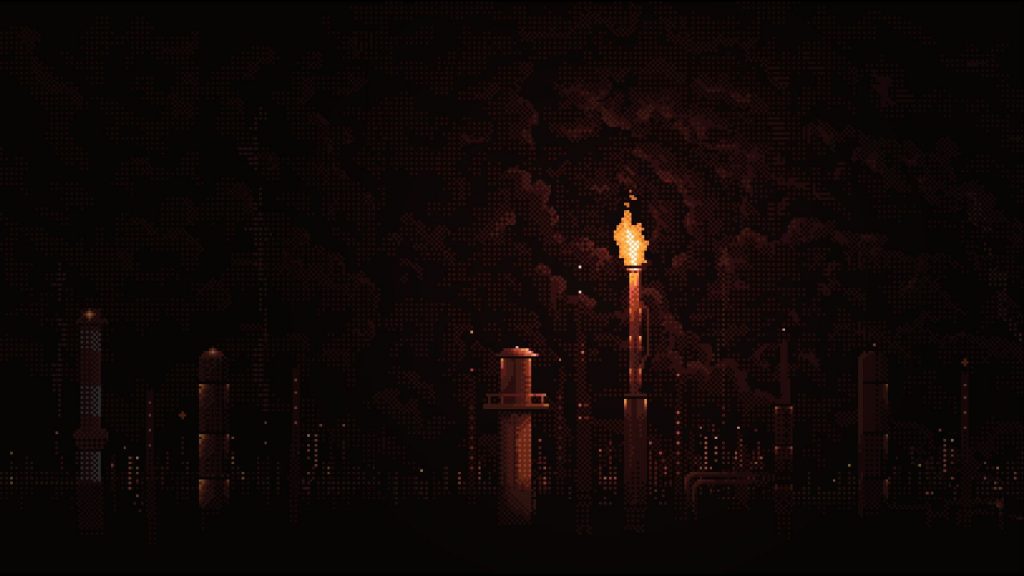Towering smokestacks, twisting fields of metal, and shades of brown and grey as far as the eye can see – Norco is a very real, enduring little town nestled along the Mississippi River in South Louisiana. In 2005, Hurricane Katrina – a monster storm that would go on record as one of the deadliest in US history – reshaped the landscape of Southern Louisiana and its neighboring states forever. The storm and its ugly aftermath have become a formative event for the younger generations who lived through it. In my conversation with Norco creator Yutsi, however, it’s clear that this sleepy little town is far more than the ghost of a storm – Norco is not only remembered for its pain, but also for its beauty.
“Back then, [my sister and I] were both playing a lot of Final Fantasy and Resident Evil,” Yutsi says. “We would just daydream about the different video game scenarios that could take place in Norco – in the refinery and in the Bonnet Carré Spillway, which is this big piece of flood control infrastructure. And that was just always a kernel inside my head. Games like Snatcher by Hideo Kojima and Déjà Vu for the NES, anything that played with text and language – I was always interested in that.”
It’s easy to see how something filled with death and decay like Resident Evil inspires a haunting, Southern Gothic text adventure at first glance, but things are a little more complicated in Norco, which is far more interested in respectfully paying tribute to the pain and beauty of its namesake. “Norco itself is a town that I love,” Yutsi tells me. “I think it’s gorgeous. It’s wonderful and full of really interesting, brilliant people. A lot of people call the game dystopian, and I absolutely see why because there’s a lot of heavy shit, but I try not to stray too far from reality. In the main, immediate experience of the game. There’s a lot of really absurd stuff that happens, but in the deep tissue of Norco, I want it to be recognizably real.”
Yutsi describes Norco as a love letter – while its weighty story may be a bitter pill to swallow, it’s an experience that has been crafted thoughtfully and carefully, looking to highlight Norco’s greatest hardships with nuance and empathy.
“I just try to be honest with it,” Yutsi says. “The political dimensions of it are clearly critical of the oil and gas industry, but I also have family who owe their careers to it. I want that complexity embedded into the game as well. I don’t want to just tell a simple moral story or parable about the damage the oil and gas industry brings. The immediate day-to-day reality of confronting those things is full of idiosyncrasies – I want to be able to explore those idiosyncrasies.”
You explore these themes as a young woman and her mother – Kay and Catherine, respectively – through a haunting backdrop of swamps, factories, and cyborgs. Norco pivots between daughter and mother to weave its tale across multiple timelines after Kay’s brother goes missing, tasking you with solving the mystery of his disappearance. Kay is an empty vessel you use to vicariously inhabit Norco throughout your investigation – though she does have a past – while Catherine possesses a more defined identity.
“[Catherine] has metastatic cancer when you begin playing [as] her,” Yutsi says. “It spreads quickly, but she’s gone through her first round of chemo when you begin playing.” He explains that she’s looking for something called “Superduck,” an AI that’s become a sentient being and organic network. Superduck employs Catherine through a phone app, which she installs due to her mounting medical debt and “shitty insurance plan.”
“As I was thinking of her situation, that seems like the only thing that would have made sense, which I suppose is accidental, inadvertent social commentary, right?” Yutsi asks. “But I wasn’t going out of my way to create it.”
However, Yutsi does want to present some subtext about “industrialization and its effects on your health,” while also trying to inject his own experiences into the game and treat the issues that arise from that with moral complexity. “When I can, I just want to challenge the player to not employ black-and-white thinking,” he says. “At certain points, I want [you] to be able to empathize with and humanize with all of the characters in the game.”
Yutsi makes that point with characters like Troy, a man who’s fired from a gas station after being automated out of his job by an app. The app replaces service workers like Troy by using animatronic arms to grab merchandise for customers. While his situation is tragic, Yutsi describes Troy as “a total dickhead,” and also calls him “rude and insufferable” – but he’s still written to evoke moral ambiguity. “I was writing it from my own experience hanging out with people who behave a lot like him who I like and whose company I enjoy,” Yutsi explains. “I want people to be somewhat sympathetic to the situation, even while they dislike him.”
Norco has a lot of tales like this. Yutsi describes it as “meaningful at any given point,” and while he thinks the game has a strong conclusion, he notes that he’s not trying to force you to solve the mystery at the heart of it.
“I’m trying to get [the player] just far enough to where they feel motivated to go to the next environment so they can experience this montage of landscapes that is South Louisiana,” he explains. “That’s my ultimate purpose: I just want them to experience this ambiance and this complicated web of stories the game embodies.”
